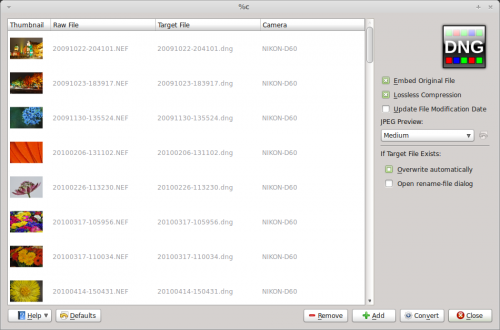Raw to DNG/it: Difference between revisions
Importing a new version from external source |
Importing a new version from external source |
||
| Line 10: | Line 10: | ||
Il formato Digital Negative (DNG) introdotto da Adobe Systems, Inc nel 2004 è progettato per superare queste carenze fornendo un formato universale aperto e ben documentato per memorizzare i file RAW. Se vuoi sapere di più del formato DNG, il sito web di DNG con articoli e collegamenti fornisce un'abbondanza di preziose informazioni sull'argomento. | Il formato Digital Negative (DNG) introdotto da Adobe Systems, Inc nel 2004 è progettato per superare queste carenze fornendo un formato universale aperto e ben documentato per memorizzare i file RAW. Se vuoi sapere di più del formato DNG, il sito web di DNG con articoli e collegamenti fornisce un'abbondanza di preziose informazioni sull'argomento. | ||
Essendo un formato aperto e ben documentato, DNG si presta particolarmente bene per archiviare nel lungo periodo le fotografie digitali. Naturalmente i formati CR2, NEF e gli altri RAW sono ampiamente adottati e supportati, non sono dunque destinati ad essere abbandonati nel breve periodo. Ma non c'è ragione per cui tu non debba salvare i tuoi file RAW nel formato DNG per essere sicuro. Dopotutto la memorizzazione al giorno d'oggi non è costosa e lo strumento DNGConverter rende estremamente facile convertire file RAW nel formato DNG. | |||
Revision as of 15:57, 19 February 2011
Convertire file RAW in DNG con DNGConverter
Trascrizione di un articolo del blog di Dmitri Popov, pubblicato il 27 gennaio 2011
digiKam è dotato di un'elegante strumento di modifica in serie che ti permette di convertire file RAW nel formato DNG. La questione è, naturalmente, perché dovresti volerlo fare. Dopotutto digiKam può gestire i file RAW senza alcun problema, dunque perché aggiungere un ulteriore passaggio al tuo lavoro con le fotografie?
Come forse sai RAW non è un formato file, ma piuttosto un termine ombrello che descrive più formati file controllati da vari produttori hardware. I formati RAW in sé sono specifici per i produttori di fotocamere digitali. Per esempio le macchine Canon memorizzano file RAW nel formato CR2, mentre le Nikon utilizzano il formato NEF. Oltre ad essere proprietari, i formati RAW sono spesso poco documentati e gravati da brevetti.
Il formato Digital Negative (DNG) introdotto da Adobe Systems, Inc nel 2004 è progettato per superare queste carenze fornendo un formato universale aperto e ben documentato per memorizzare i file RAW. Se vuoi sapere di più del formato DNG, il sito web di DNG con articoli e collegamenti fornisce un'abbondanza di preziose informazioni sull'argomento.
Essendo un formato aperto e ben documentato, DNG si presta particolarmente bene per archiviare nel lungo periodo le fotografie digitali. Naturalmente i formati CR2, NEF e gli altri RAW sono ampiamente adottati e supportati, non sono dunque destinati ad essere abbandonati nel breve periodo. Ma non c'è ragione per cui tu non debba salvare i tuoi file RAW nel formato DNG per essere sicuro. Dopotutto la memorizzazione al giorno d'oggi non è costosa e lo strumento DNGConverter rende estremamente facile convertire file RAW nel formato DNG.

Using DNGConverter couldn’t be easier. Launch the utility, add the RAW files, specify a few options, and hit the button. For complete peace of mind, you might want to enable the option which embeds the source RAW file into the resulting DNG file.
